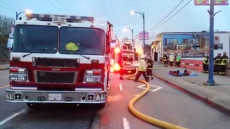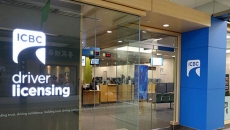VANCOUVER - Near the end of 2018, Sheldon Petrie moved $40,000 into a self-directed registered retirement savings plan and watched his nest egg grow to about $55,000 at its peak. As of Thursday, Petrie's account had sunk by some $12,000 as markets plummeted amid the spread of the novel coronavirus.
Despite the drop, Petrie regrets not having more money to funnel into his investment accounts now while stocks are cheaper.
"My big thing, personally, is ... wishing I could invest more," said Petrie, who is 37 years old and lives in Kitchener, Ont. "For me, it's a buying opportunity."
While many Canadians may be panicking as they watch their retirement funds drop by tens or hundreds of thousands of dollars, financial experts say it's important to stay the course regardless of how close to retirement they are — and even if they've already finished working.
"I would certainly encourage all of us to take a big collective deep breath," said Karin Mizgala, co-founder and CEO of Money Coaches Canada, a national advice-only financial planning service.
The current situation, she acknowledged, created multiple fears. The spread of COVID-19 has people worrying not only about their health, but also their finances and the broader economy.
Canada's major stock index, the S&P/TSX composite index, nose dived from a year-to-date high of 17,970.51 points to 12,170.52 by the market's close Thursday. That's a stomach-churning drop of more than 32 per cent.
When people make dramatic investment decisions during a time of heightened anxiety, Mizgala said, it often makes things worse.
"We have the potential to multiply the downside here," she said.
For young people with retirement far on the horizon who don't need the money from their RRSPs now, the choice to stay the course is easier, she noted.
"You have such a number of years to recover from any kind of major market declines."
Petrie, who at 37 is still far off from the standard 65-year-old retirement age, plans to keep making his scheduled monthly deposits into his registered savings plan. In fact, he may shift some short-term savings earmarked for travel, which he won't be able to do in the foreseeable future amid mass border shutdowns, toward retirement savings too.
For people closer to or already in retirement, the recent drop may be more troubling.
Kelley Keehn, a consumer advocate for financial planners group FP Canada, has been hearing from lots of nervous people who are five or 10 years away from stopping work.
She reminds them that people don't withdraw all their retirement savings in their first year out of work, but rather spread it out over the remainder of their life.
"It's not like you have to cash it all out the year that you retire, and I think people forget that," she said.
As people approach retirement or live it, they'll shift how much money is invested and how much they keep in cash, generally speaking, she said, to provide for at least a couple years' living expenses in cash. That money wouldn't be impacted by the market drop and provides a buffer for the individual's remaining investments to recover.
There are some ways to alleviate any short-term difficulties, said Mizgala.
This week, the federal government announced it was lowering required minimum withdrawals from Registered Retirement Income Funds (RRIFs) by 25 per cent for this year.
That provides retirees some flexibility for how much money can remain in the RRIF to recoup value, said Mizgala, provided they can cover their living expenses without dipping further into their funds.
Another possibility, she said, is to defer planned monthly or quarterly RRIF withdrawals until the end of the year.
"Hopefully, we'll see at least some recovery in the markets by then."
Retirees may also want to consider spending less or deferring purchases for discretionary expenses, she said, while waiting for their investments to rebound.
Both women suggest investors speak with their financial advisers to feel more confident in their plans.
Another hint for the anxious: take a closer a look at historical market activity to feel reassured that bear markets do tend to correct — just not overnight.
In 2008, the TSX lost 35 per cent of its value, closing out the last trading day of the year at 8,987.7 points after record highs of more than 15,000 in June of that year. The market eventually recovered. The gains in U.S. equity markets from their 2008-09 lows were even higher.
Nonetheless, this current drop may prompt people to re-examine their risk tolerance for the stock market and opt to invest in what are considered safer vehicles. Just remember many of those options come with a lower return over time, said Keehn.
"The takeaway is: If this was causing you sleepless nights, maybe in the future you need to adjust your risk tolerance and your risk exposure. But it doesn't mean acting on it now. That's for darn sure... This is not the time to make those changes."




